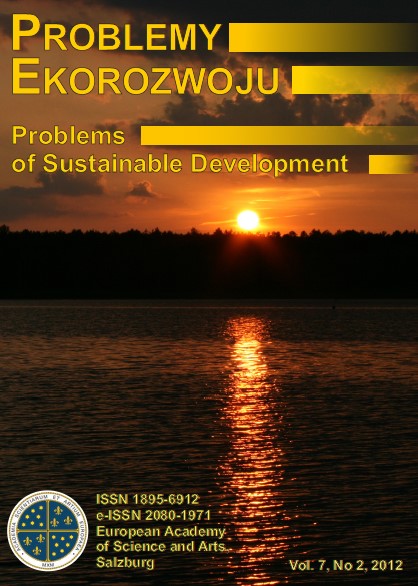Do the Liberal Capitalism and Globalization Enable the Implementation of Sustainable Development Strategy?
Article Sidebar
Issue Vol. 7 No. 2 (2012)
-
Information: Impact Factor
Lucjan Pawłowski5
-
Do the Liberal Capitalism and Globalization Enable the Implementation of Sustainable Development Strategy?
Lucjan Pawłowski7-13
-
Energy Production from Maize
David Piementel15-22
-
Revealing the Level of Tension Between Cultural Heritage and Development in World Heritage Cities
Molly Turner, Ana Pereira Roders, Marc Patry23-31
-
Low Carbon Development of China’s Yangtze River Delta Region
Shengdao Shan, Xiaohang Bi33-41
-
Sustainable Development: the Upcoming Civilizational Revolution?
Ignacy S. Fiut43-50
-
Social Policy in the European Sustainable Development Strategy
Aleksandra Ciżmowska51-59
-
Does the Evangelical Understanding of the Concept of Property Serve Sustainable Development?
Karolina Szulc61-65
-
Man and Nature. A New Project on New Spirituality
Zbigniew Pasek, Agnieszka Dyczewska67-76
-
Selecting Sustainability Indicators for Local Community – Case Study of Milanówek Municipality, Poland
Justyna Gutowska, Jerzy Śleszyński, Małgorzata Grodzińska-Jurczak77-86
-
Polish Planners’ Attitudes Towards Citizen Participation
Łukasz Damurski87-96
-
Ecosystem Services in the Light of a Sustainable Knowledge-based Economy
Artur Michałowski97-106
-
Eco-management in Polish Companies
Ewa Bojar, Matylda Bojar, Anna Żelazna-Blicharz, Piotr Blicharz107-113
-
Letter to the Editorial Office: Time for the Intellect to Take Over From Mind
G Venkatesh115-117
Archives
-
Vol. 9 No. 2
2014-07-01 16
-
Vol. 9 No. 1
2014-01-02 19
-
Vol. 8 No. 2
2013-07-01 13
-
Vol. 8 No. 1
2013-01-02 12
-
Vol. 7 No. 2
2012-07-02 14
-
Vol. 7 No. 1
2012-01-02 12
-
Vol. 6 No. 2
2011-07-01 19
-
Vol. 6 No. 1
2011-01-03 18
-
Vol. 5 No. 2
2010-07-01 21
-
Vol. 5 No. 1
2010-01-04 16
Main Article Content
Authors
Abstract
One of paradigms of sustainable development is intra-generational justice, which requires the active role of the state to balance the power of international corporations with the interests of paid workers. The changes initiated by Ronald Reagan and Margaret Thatcher, which led to the weakening of trade unions and the controlling role of the state, resulted in an escalation of inequality. Globalisation is applied to this, in an age where the influences of large multinational corporations, geared primarily for profit, do not have a strong partner who could effectively control them. Consequently, in spite of an increase in worker productivity, regions of poverty on a global scale do not diminish. Instead, vast concentrations of capital accrue in the hands of narrow groups of people. In particular, the liberalisation of the financial markets should be regarded as dangerous which, as a result of speculations, appropriate vast resources without contributing to the creation of added value. It is necessary to return to the concept of the welfare state to significantly improve the quality of life for most citizens. Nowadays, liberal capitalism represents a considerable threat to the realisation of the sustainable development idea.
Keywords:
References
WCED, Our Common Future, Oxford University Press, Oxford 1987.
CIĄŻELA H., 2007, Antycypacja idei „rozwoju trwałego i zrównoważonego” w koncepcji „nowego humanizmu” Aurelio Peccei, in: Problemy Ekorozwoju/Problems of Sustainable Development, vol. 2, no 2, p. 59-67.
DOŁEGA J. M., 2007, Systemy wartości w zrównoważonym rozwoju, in: Problemy Ekorozwoju/Problems of Sustainable Development, vol. 2, no 2, p. 41-49.
FOTOPOULOUS T., 2007, Is Growth Compatabile with a Market Economy, in: International Journal of Inclusive Democracy, vol. 3, no 1.
GAWOR L., 2006, Antyglobalizm, alterglobalizm I filozofia zrównoważonego rozwoju jako globalizacyjne alternatywy, in: Problemy Ekorozwoju/ Problems of Sustainable Development, vol. 1, no 1, p. 41-48.
GAWOR L., 2010, Filozofia zrównoważonego rozwoju – preliminaria, in: Problemy Ekorozwoju/Problems of Sustainable Development, vol. 5, no 2, p. 69-76.
HUETING R., 2011, Ekologicznie zrównoważony dochód narodowy i inne sposoby metody poprawy jakości informacji na temat wzrostu gospodarczego, in: Problemy Ekorozwoju/ Problems of Sustainable Development, vol. 6, no 1, p. 31-46.
HULL Z., 2008, Filozoficzne i społeczne uwarunkowania zrównoważonego rozwoju, in: Problemy Ekorozwoju/Problems of Sustainable Development, vol. 3, no 1, p. 27-31.
IKERD J., 2008, Sustainable Capitalism: A Matter of Ethics and Morality, in: Problemy Ekorozwoju/Problems of Sustainable Development, vol. 3, no 1, p. 13-22.
KEITSCH M. M. 2011, Ethics in Industrial Ecology, in: Problemy Ekorozwoju/Problems of Sustainable Development, vol. 6, no 2, p. 19-31.
KRAS E.M., 2011, The Deep Roots in Sustainability, in: Problemy Ekorozwoju/Problems of Sustainable Development, vol. 6, no 1, s.11-30.
LASZLO Ch., 2008., Sustainable Value, in: Problemy Ekorozwoju/ Problems of Sustainable Development, vol. 3, no 2, p. 25-29.
LISZEWSKI D., 2007, Etyczne podstawy rozwoju zrównoważonego, in: Problemy Ekorozwoju/ Problems of Sustainable Development vol. 2, no 1, p. 27-33.
PAWŁOWSKI L., 2011, Sustainability and Global Role of Heavy Metals, in: Problemy Ekorozwoju/Problems of Sustainable Development, vol. 6, no 1, p. 59-64.
PAWŁOWSKI A., 2006, Wielowymiarowość rozwoju zrównoważonego, in: Problemy Ekorozwoju/Problems of Sustainable Development, vol. 1, no 1, p. 23-32.
PAWŁOWSKI A., 2008, Editorial: The Role of Social Sciences and Philosophy in Shaping of the Sustainable Development Concept, in: Problemy Ekorozwoju/Problems of Sustainable Development, vol. 3, no 1, p. 7-11.
TUZIAK A., 2010, Socio-Economic Aspects of Sustainable Development on Global and Local Level, in: Problemy Ekorozwoju/Problems of Sustainable Development, vol. 5, no 2, p. 39-49.
TYBURSKI W., 2007, Etyczne założenia edukacji dla zrównoważonego rozwoju, in: Problemy Ekorozwoju/Problems of Sustainable Development, vol. 2, no 1, p. 41-47.
UDO V., PAWŁOWSKI A., 2011, Human Progress Towards Equitable Sustainable Development – part II: Empirical Exploration, in: Problemy Ekorozwoju/Problems of Sustainable Development, vol. 6, no 2, p. 33-62.
Article Details
Abstract views: 85
License

This work is licensed under a Creative Commons Attribution-ShareAlike 4.0 International License.


